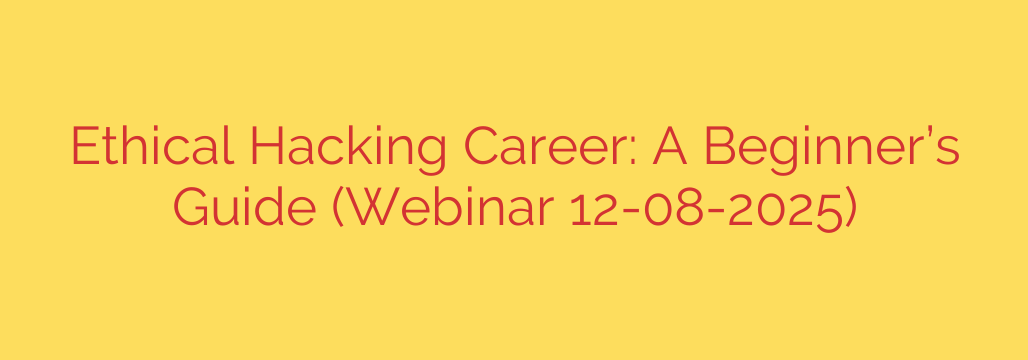
Your Roadmap to Becoming an Ethical Hacker: A Beginner’s Guide
In an age defined by data, cybersecurity has moved from a niche IT concern to a global priority. With every major data breach that hits the headlines, the demand for skilled professionals who can protect digital assets skyrockets. Enter the ethical hacker—a crucial player on the front lines of digital defense.
But what does it mean to be an ethical hacker, and how can you start a career in this exciting and rewarding field? This guide provides a clear roadmap for anyone looking to turn their interest in cybersecurity into a profession.
What Exactly Is an Ethical Hacker?
An ethical hacker, often called a “white hat” hacker, is a security expert who uses the same tools and techniques as malicious attackers (or “black hat” hackers) to find and fix vulnerabilities in computer systems. The key difference is permission. Ethical hackers work with the explicit consent of system owners to strengthen their security, not exploit it.
Think of it like a bank hiring a master locksmith to try and break into their own vault. The locksmith’s goal isn’t to steal anything but to identify weak points in the security system so the bank can fix them before a real burglar does. In the digital world, ethical hackers are these expert “locksmiths,” providing an essential service to businesses, governments, and organizations of all sizes.
Why Pursue a Career in Ethical Hacking?
If you’re looking for a dynamic career path, ethical hacking offers compelling advantages:
- High Demand: There is a massive global shortage of qualified cybersecurity professionals. This skills gap means that those with the right expertise are highly sought after.
- Lucrative Compensation: Due to the high demand and the critical nature of the work, ethical hacking and related cybersecurity roles often come with competitive salaries.
- Engaging and Challenging Work: The field is constantly evolving. You’ll always be learning new technologies and pitting your skills against new challenges, making it a career that never gets boring.
- Making a Real Impact: As an ethical hacker, you play a direct role in protecting sensitive information and making the digital world a safer place for everyone.
The Essential Skills You Need to Master
Becoming a successful ethical hacker requires a unique blend of technical knowledge and critical thinking. While the field is vast, here are the foundational skills you must develop:
- Solid Networking Knowledge: You need to understand how networks operate inside and out. Mastering concepts like TCP/IP, subnetting, the OSI model, and common network protocols is non-negotiable.
- Proficiency with Operating Systems: Deep familiarity with both Windows and Linux is crucial. Kali Linux, a distribution packed with security tools, is an industry standard you’ll need to learn.
- Scripting and Programming Skills: You don’t need to be a software developer, but you must be able to read, write, and modify code. Python is widely regarded as the most valuable language for hacking and automation, followed by Bash scripting.
- Understanding of Security Principles: Knowledge of core security concepts like cryptography, firewalls, intrusion detection systems (IDS), and public key infrastructure (PKI) is fundamental.
- Problem-Solving Mindset: At its core, hacking is about creative problem-solving. You need to think like an attacker to anticipate their moves and identify weaknesses others might miss.
Your Step-by-Step Roadmap to an Ethical Hacking Career
Ready to get started? Here is a practical, step-by-step plan to guide your journey.
Step 1: Build Your Foundational Knowledge
Before you can run, you must walk. Don’t jump straight into hacking tools without understanding the “why” behind them. Focus on mastering the basics of networking, operating systems, and basic scripting. Online courses, books, and free tutorials are excellent resources.
Step 2: Get Hands-On in a Safe Environment
Theory is important, but practical experience is what truly builds skill. Never practice on systems you do not own or have permission to test. Instead, use dedicated platforms designed for learning:
- Virtual Labs: Set up your own virtual lab using software like VirtualBox or VMware to safely practice with different operating systems and tools.
- Capture The Flag (CTF) Competitions: These are ethical hacking games that challenge you to find hidden “flags” in purposefully vulnerable systems.
- Online Platforms: Websites like Hack The Box and TryHackMe provide safe, legal, and engaging environments to hone your skills on real-world scenarios.
Step 3: Earn Industry-Recognized Certifications
Certifications validate your knowledge and can significantly boost your resume. They show employers you have a verified skill set. Key certifications to consider include:
- Entry-Level: CompTIA Security+ is the gold standard for proving you have the core knowledge for any cybersecurity role.
- Intermediate: The Certified Ethical Hacker (CEH) certification is one of the most recognized in the field and focuses on hacking tools and methodologies.
- Advanced: The Offensive Security Certified Professional (OSCP) is a highly respected, hands-on certification that requires you to compromise various machines in a 24-hour practical exam.
Step 4: Understand the Law and Code of Ethics
This cannot be overstated. Ethical hacking operates within strict legal and ethical boundaries. Familiarize yourself with cybercrime laws like the Computer Fraud and Abuse Act (CFAA) in the U.S. and similar legislation in your region. Always remember that your work is contingent on permission, professionalism, and integrity.
By following this roadmap and dedicating yourself to continuous learning, you can build a successful and fulfilling career as an ethical hacker, becoming a vital guardian of our digital future.
Source: https://www.simplilearn.com/how-to-build-a-career-in-ethical-hacking-from-scratch-webinar








